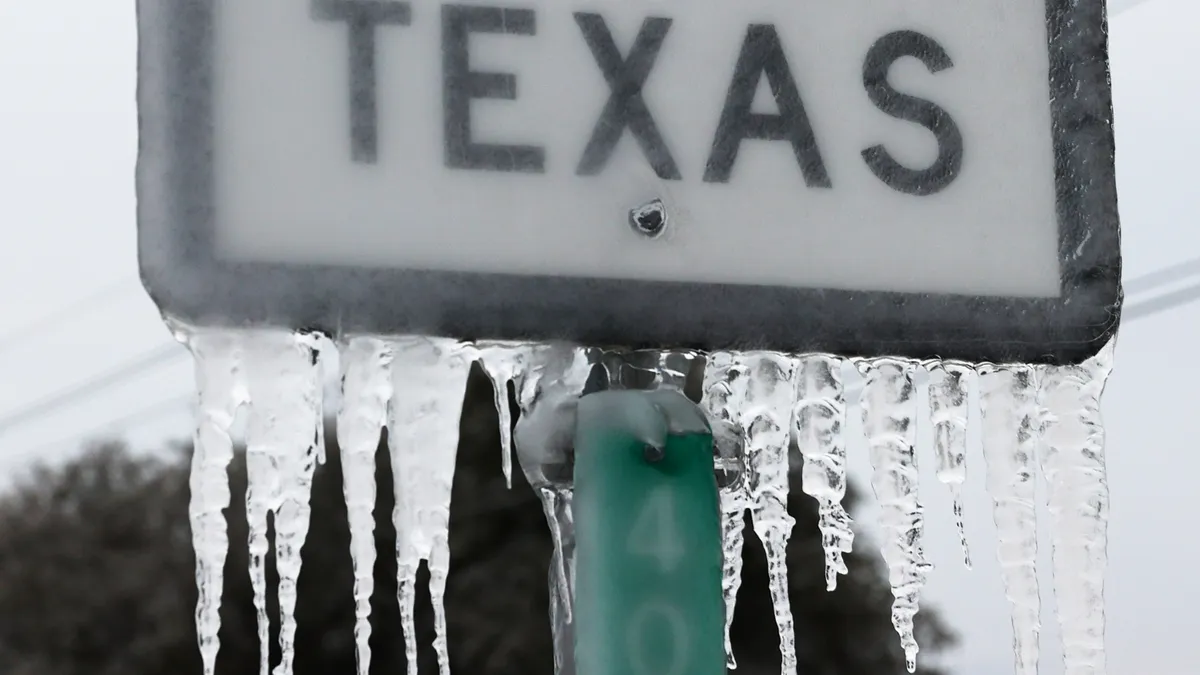Dive Brief:
- A cold front will move across parts of the U.S. South and Texas on Wednesday, according to Weather.com, potentially spiking electricity demand and worrying some utility customers that they could see a repeat of widespread blackouts that left more than 100 dead in a winter storm a year ago this month.
- The Electric Reliability Council of Texas (ERCOT) says it is prepared for higher demand from Wednesday to Sunday and is "taking early preventative action ahead of the expected increase in demand to ensure the grid remains reliable.”
- The grid operator last year required power plants and transmission facilities to winterize, but critics warn natural gas infrastructure remains vulnerable to prolonged freezing temperatures. While the storm is not expected to be as severe as the one in 2021, experts say a widespread freeze could put some electric generation at risk.
Dive Insight:
It was a year ago this month that Winter Storm Uri hit Texas, freezing a variety of energy infrastructure and leading to more than 50,000 MW of lost generation. ERCOT, utility regulators and state lawmakers have all tried to ensure the situation does not repeat, and this week's cold front may present the first real test.
ERCOT is now expecting peak demand of almost 75 GW for Friday morning, Doug Lewin, an energy analyst and president of Stoic Energy, said in a Sunday tweet, and outages at thermal plants are higher than the grid operator had expected. Last winter's peak was about 77 GW, he said.
"That's a lot of power," Lewin wrote. "This is still nothing like last February and I'm not worried."
Former Democratic Texas Rep. Beto O'Rourke, now a candidate to replace Gov. Greg Abbott, R, has launched a statewide "Keeping the Lights On" tour to highlight what he sees as Abbott's failure on grid resilience.
Since that disaster in February the state has "still failed to fix problems within the grid," O'Rourke told news station KFOX14 on Monday.
"All of us hope and pray the grid stays together, and power continues to be produced and transmitted," he said.
ERCOT issued a statement acknowledging the weather forecast, but said it is taking early steps to ensure the lights stay on.
“ERCOT will deploy all the tools available to us to manage the grid effectively during this winter weather," ERCOT CEO Brad Jones said. The grid operator is coordinating with the Texas Division of Emergency Management, the Public Utility Commission and elected officials, he added, along with electric generators and transmission and distribution utilities.
"We have ordered power plants across the region to postpone planned outages and to return from outages already in progress," Jones said.
ERCOT in December said power plants and transmission facilities in its footprint have been weatherized and consumers "can be confident" they will deliver electricity during the winter months. Gas facilities, however, do not face the same requirements.
A combination of freezing and fuel issues caused about three-quarters of the unplanned generating unit outages, derates and failures to start during the February 2021 storm, according to a joint report by the Federal Energy Regulatory Commission and North American Electric Reliability Corp. Of those, gas-fired units experienced 58% of all generating unit issues.
Alison Silverstein, an independent consultant working on Texas issues, said she is "cautiously optimistic" about ERCOT's ability to deliver energy this week — but added that if an extended freeze hits gas producers, the consequences could cascade.
"The odds are that if anything freezes up in this event, it’ll be West Texas natural gas production and delivery rather than ERCOT’s winterized power plants," Silverstein said in an email. Gas prices are already rising in anticipation, she said.
Winter weather has already halted some gas production this year. According to BloomberNEF, Texas gas production declined more than 6% on Jan. 20 due to freezing temperatures.
If this week tracks similar to past events, "we’ll likely see gas production fall and pipeline reallocations," Silverstein said, "which could compromise some electric generation."















